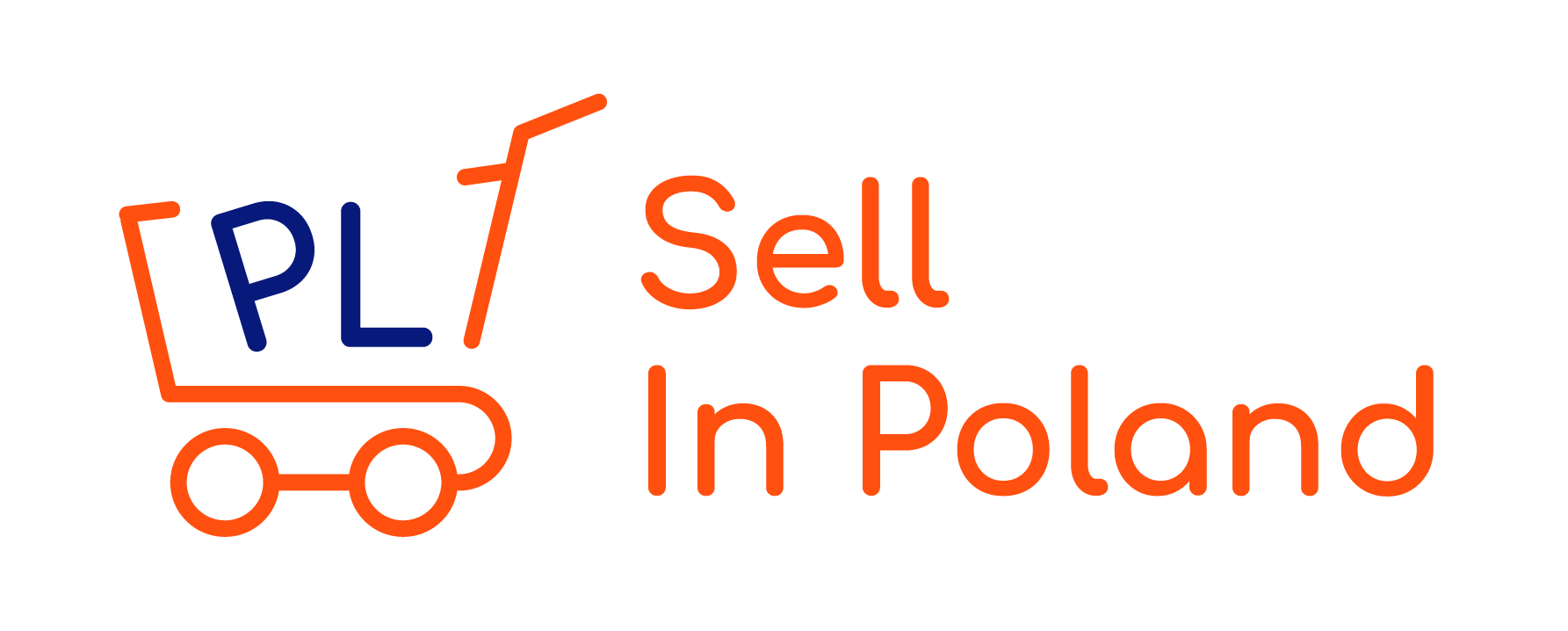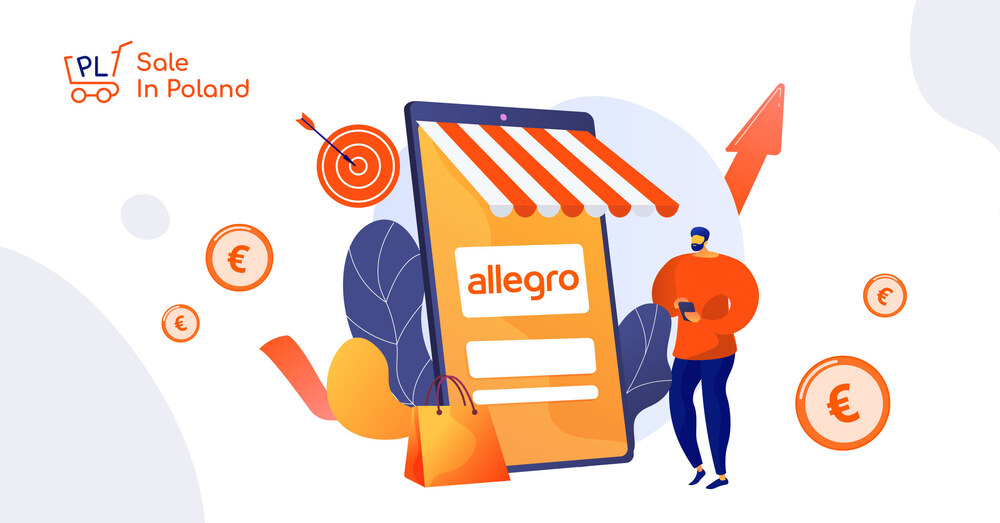Allegro not only maintains a strong position in the Polish market, but it also stands as an intriguing business case when compared to global giants such as Amazon and eBay. Thanks to its innovative approach to sales, effective use of modern technology, and deep understanding of local consumer needs, the platform has developed a business model that ensures its ongoing success.
The history and evolution of Allegro – Poland’s most popular e-commerce platform
Founded in 1999, Allegro quickly became one of the most significant players in the Polish e-commerce market. Initially, the platform began modestly, offering online auctions where users could buy and sell various products through a simple interface. Over the years, Allegro evolved into a fully-fledged e-commerce platform that now offers both new and used products from millions of users and businesses.
Over the past two decades, Allegro has expanded its services, introducing numerous innovations and improvements that have contributed to its dominance. The platform continuously updates its algorithms, enhances security systems, and introduces new features such as Allegro Lokalnie, Allegro Smart! (a loyalty programme offering free delivery and other perks), and a robust logistics infrastructure.
Allegro’s dominance in Polish e-commerce
E-commerce in Poland is growing at an impressive rate, becoming one of the most dynamic sectors of the market. Recent statistics show that the value of the Polish e-commerce market grew significantly, reaching around 70 billion złoty in 2020, a more than 30% increase compared to the previous year. This upward trend has continued in the following years, reflecting the growing interest of Poles in online shopping.
Let’s take a closer look at the landscape of e-commerce in Poland. In this graph, you can see the number of monthly visits to marketplaces available on the Polish market. Some of them seem to be doing quite well, but one marketplace is notably missing…
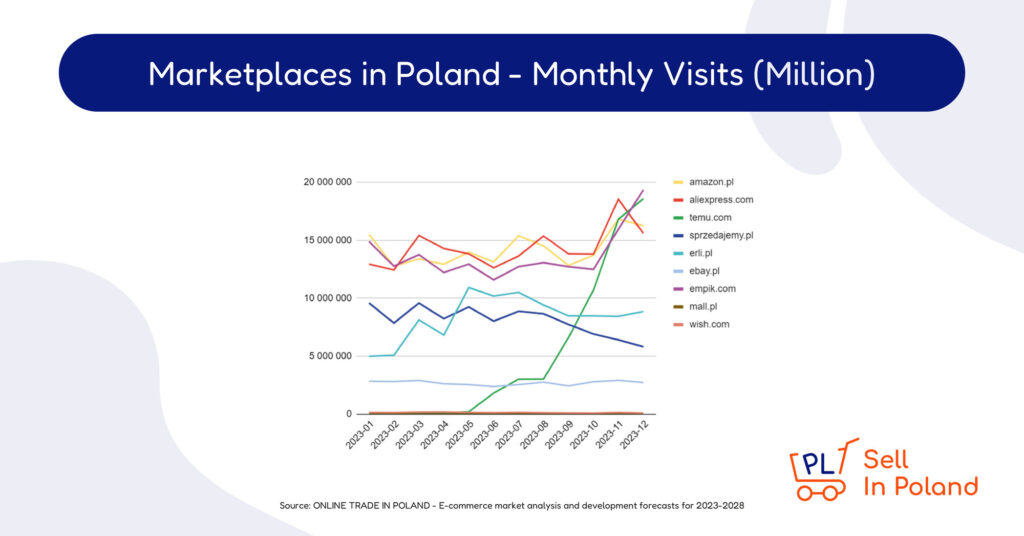
Now, let’s see how the graph changes when we add data on Allegro’s monthly visits.
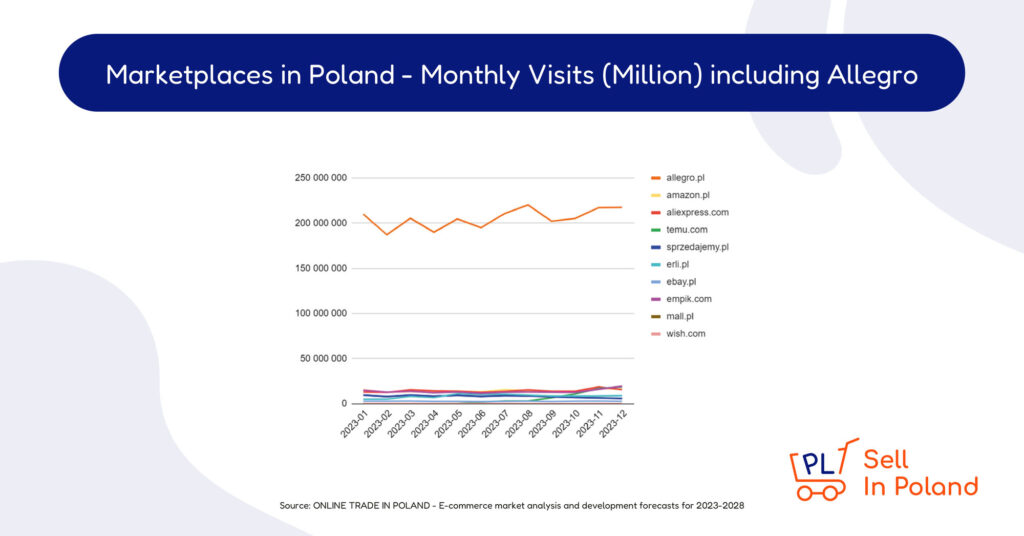
Next, let’s examine whether this number of visitors also translates into actual profits and sales (next slide). Here is the total GMV (Gross Merchandise Volume) of other marketplaces in Polish złoty…
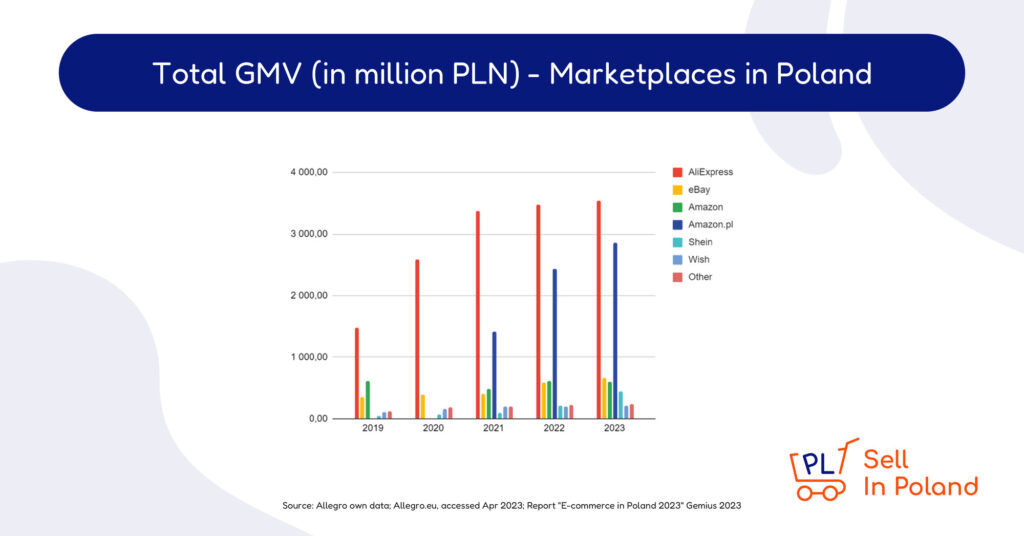
And here, when we add Allegro to the chart. I hope this helps point you in the right direction if you’re looking to sell in Poland and illustrates the scale of this business.
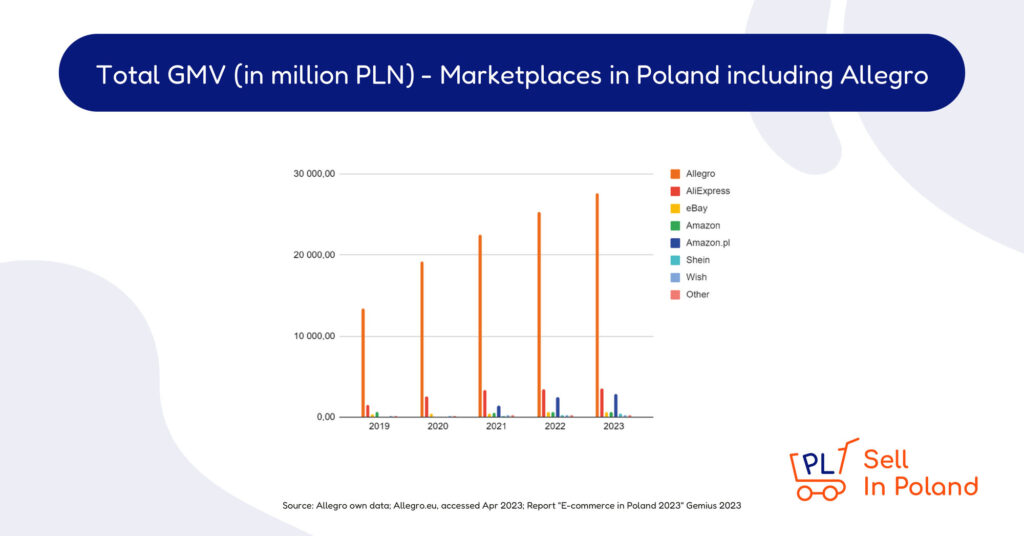
Top product categories in Polish e-commerce
- Various product categories dominate the Polish e-commerce landscape, each meeting the specific needs of consumers:
Electronics and technology – This category remains consistently popular, with phones, computers, and electronic accessories topping the list of the most purchased online products. - Fashion – Clothing, footwear, and accessories form another strong category, attracting a large number of buyers by offering a wide range of brands and products.
- Home and garden products – Furniture, decorations, household appliances, and gardening tools are also highly popular among consumers.
- Health and beauty – Cosmetic products, dietary supplements, and fitness equipment are categories that have gained importance, particularly during the pandemic.
- Groceries – The growing popularity of online grocery shopping is one of the most significant changes in consumer behaviour in recent years.
The impact of COVID-19 on online sales in Poland
The COVID-19 pandemic had a significant impact on the growth of online sales in Poland. The restrictions imposed and increased health awareness contributed to an explosion in e-commerce popularity. In 2020, there was a more than 40% increase in online transactions, a direct result of limited access to traditional forms of retail. Consumers were drawn not only by the ability to shop without leaving home but also by the wide availability of products and flexible delivery options.
This trend led to the rapid development of e-commerce infrastructure, including logistics systems, online payment methods, and sales platforms. As the market leader, Allegro played a key role in helping consumers adapt to this new reality, offering safe and convenient shopping with home delivery, further strengthening its market position.
Comparing Allegro with global giants like Amazon and eBay
Allegro is often compared to global e-commerce giants such as Amazon and eBay, but it has unique features that set it apart from these platforms:
- Business model: Unlike Amazon, which acts as both a retailer and a platform for sellers, Allegro remains primarily a marketplace where independent sellers dominate.
- Adaptation to the local market: Allegro is highly tailored to the needs and preferences of Polish users, offering local payment methods, Polish-language support, and promotions tied to local holidays and occasions.
- Scale of operations: While eBay and Amazon operate globally, Allegro focuses on the Polish market, allowing it to better understand and meet the needs of local consumers.
Key factors behind Allegro’s success
Allegro’s success can be attributed to several key factors:
- Understanding the local market: Allegro has an excellent grasp of Polish consumers, enabling it to respond effectively to their needs and preferences.
- Innovation: The platform regularly introduces new features and services that simplify shopping and selling, such as Allegro Smart! or quick delivery options.
- Security and trust: Allegro invests in transaction security, which builds trust among users. The ratings and reviews system ensures transparency and helps in choosing reliable sellers.
- Developed logistics infrastructure: Allegro has built an efficient logistics system that allows for fast and seamless product delivery.
- Customer orientation: Thanks to its extensive customer service and flexible return and complaint options, Allegro maintains a high level of customer satisfaction.
With these elements, Allegro not only retains its leadership position in Polish e-commerce but also tackles future challenges by dynamically responding to changing market conditions.
Technology and innovation: Benefits for sellers on Allegro
Allegro continuously develops its technology to support sellers in efficiently managing their operations on the platform. The use of advanced technological solutions enables the optimisation of sales, process automation, and increased customer satisfaction.
- Allegro Fulfillment: This service allows sellers to take advantage of comprehensive logistics support offered by Allegro. The storage of goods, packaging, and handling of returns and complaints are carried out at Allegro’s logistics centre, significantly speeding up delivery to the customer and reducing sellers’ operational costs.
- Allegro Smart!: The Allegro Smart! programme benefits not only buyers but also sellers. Through this option, sellers can increase the visibility of their offers and improve conversion rates, as products covered by Allegro Smart! enjoy greater customer trust.
- Allegro API: Automation is key to efficient online sales. The Allegro API allows sellers to integrate their systems with the platform, simplifying the management of offers, sales processes, and real-time data analysis.
- Allegro Ads: With advanced advertising tools, sellers can effectively promote their products on the platform. Allegro Ads allows for targeted advertising to specific customer groups, increasing marketing and sales effectiveness.
- Loyalty programmes and promotions: Allegro regularly offers sellers the opportunity to participate in promotions and loyalty programmes, encouraging buyers to shop more frequently and in larger quantities, while also increasing sellers’ profitability.
Innovations introduced on the platform and their impact on sellers
Allegro introduces numerous innovations aimed at improving not only the shopping process for users but also providing sellers with tools to increase their efficiency and profits.
- Smart recommendation systems: Using machine learning algorithms, Allegro tailors product search and recommendations to help sellers reach interested customers more effectively. This increases the chances of a quicker sale.
- Allegro Lokalnie for sellers: This feature allows sellers to reach customers in their local area, which is particularly beneficial for small and medium-sized enterprises and sellers specialising in local products.
- Mobile solutions: Allegro’s mobile apps are constantly updated, offering sellers convenient management of offers and communication with customers anywhere, anytime.
- EkoSmart for sellers: The EkoSmart programme allows sellers to stand out on the platform by promoting eco-friendly and sustainable products, attracting an ever-growing group of environmentally conscious customers.
- Allegro Pay for sellers: With the instalment payment option, sellers can offer customers the ability to purchase higher-value products without immediate payment, increasing the average order value and attracting a new group of buyers.
Thanks to these innovations, sellers on Allegro can not only increase their revenues and profits but also build a stronger market position by leveraging the latest technologies to efficiently manage their business.
Key takeaways from the analysis of the Polish e-commerce market
The Polish e-commerce market is one of the fastest-growing in Europe, driven by several key factors. The rapid growth in recent years has demonstrated how significant a role online shopping has begun to play in the daily lives of Poles, especially in the face of the global COVID-19 pandemic, which further accelerated this trend.
- Rapid growth and adaptation: Poles are increasingly taking advantage of the opportunities offered by online commerce. Significant investments in digital and logistics infrastructure have improved the availability of e-commerce services throughout the country.
- Diversification and specialisation: The variety of product categories available online continues to grow, offering consumers a wide range of choices – from electronics to clothing, groceries, and specialised products.
- Innovation and technology: Polish e-commerce platforms, led by Allegro, are constantly introducing new technologies and innovations, such as Allegro Smart! or Allegro Fulfillment, which simplify shopping, enhance user experiences, and increase sellers’ efficiency.
- Changing consumer behaviour: Poles are becoming more conscious of online shopping, seeking not only convenience but also security. There is growing interest in eco-friendly and local products, influencing sellers’ strategies.
With Allegro at the forefront, Polish e-commerce is experiencing a golden age
As the undisputed leader of the Polish e-commerce market, Allegro has played a key role in shaping modern shopping trends. Its impact on the development of online trade in Poland is invaluable, both economically and technologically. The innovations introduced by Allegro, excellent customer service, and continuous improvement of sales processes make this platform a model for other market players.
Allegro’s commitment to developing services such as Allegro Fulfillment and the Allegro Smart! programme shows how the platform not only responds to market needs but also actively shapes them, creating better conditions for both sellers and buyers. Allegro is not just a sales portal; it is a rapidly growing ecosystem that supports the Polish economy and opens new opportunities for e-commerce in Poland.
Given all these factors, it is safe to say that Allegro will continue to dominate and shape the future of online commerce in Poland.
